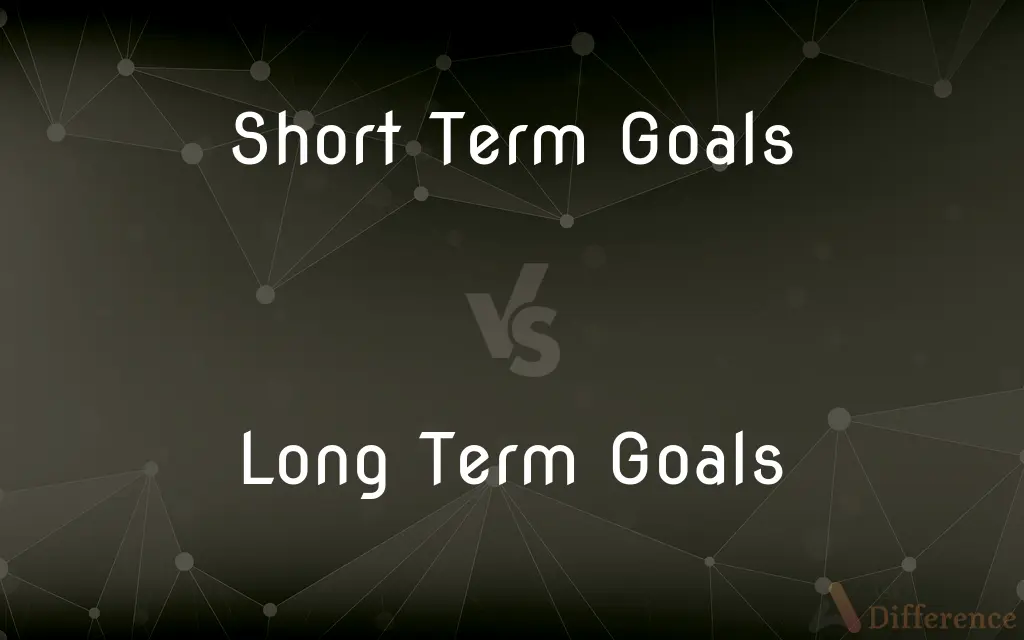Short Term Goals vs. Long Term Goals — What's the Difference?
Edited by Tayyaba Rehman — By Fiza Rafique — Published on November 1, 2023
Short Term Goals are objectives set for immediate or near-future achievement; Long Term Goals target broader aspirations over extended periods.

Difference Between Short Term Goals and Long Term Goals
Table of Contents
ADVERTISEMENT
Key Differences
Short Term Goals refer to objectives or targets that individuals or entities aim to achieve within a relatively brief period, typically ranging from days to a year. They are often tactical, addressing immediate needs or tasks. In contrast, Long Term Goals focus on broader, strategic aspirations that may span several years or even a lifetime.
While both Short Term Goals and Long Term Goals are essential for personal and professional development, they serve different purposes. Short Term Goals act as stepping stones, helping individuals make progress towards larger objectives. On the other hand, Long Term Goals provide direction, giving individuals or organizations a clearer sense of purpose and vision.
In planning and execution, Short Term Goals often require more immediate attention and may necessitate frequent check-ins or adjustments. Conversely, Long Term Goals might be revisited less often, undergoing modifications as circumstances or aspirations evolve.
Short Term Goals can often be more specific, with clear and tangible outcomes. For instance, saving a certain amount of money within a month can be a short-term financial goal. Long Term Goals, however, might be broader, such as achieving financial independence or building a successful career over decades.
The achievement of Short Term Goals can offer immediate gratification and motivation, propelling individuals towards their Long Term Goals. The latter, given their extended nature, require perseverance, patience, and consistent effort over time.
ADVERTISEMENT
Comparison Chart
Duration
Days to a year
Several years to a lifetime
Purpose
Address immediate tasks or needs
Broader, strategic aspirations
Adjustment Frequency
Often require frequent check-ins or adjustments
Revisited and modified less often
Specificity
Typically more specific and tangible
Might be broader and less defined
Gratification and Motivation
Offer immediate gratification and can be stepping stones
Require perseverance and provide long-term direction
Compare with Definitions
Short Term Goals
Often tactical and specific.
My Short Term Goals include losing 5 pounds this month and attending three seminars.
Long Term Goals
Require consistent effort and perseverance.
Achieving my Long Term Goals will demand patience and dedication.
Short Term Goals
Objectives intended for immediate achievement.
One of my Short Term Goals is to finish reading a book by next week.
Long Term Goals
Objectives spanning several years or a lifetime.
One of my Long Term Goals is to retire by the age of 50.
Short Term Goals
Tasks or targets spanning days to a year.
I've set some Short Term Goals for the upcoming quarter at work.
Long Term Goals
Might undergo modifications over time.
I've adjusted my Long Term Goals as I've gained more life experiences.
Short Term Goals
Provide immediate motivation and gratification.
Meeting my Short Term Goals boosts my confidence and drive.
Long Term Goals
Provide direction and a sense of purpose.
Having Long Term Goals keeps me focused on the bigger picture.
Short Term Goals
Stepping stones towards larger objectives.
By accomplishing my Short Term Goals, I'll be closer to my yearly targets.
Long Term Goals
Broad, strategic aspirations.
Building a successful business is one of my Long Term Goals.
Common Curiosities
Which goal provides a clearer sense of purpose and vision?
Long Term Goals give a broader sense of direction.
Which goals act as stepping stones?
Short Term Goals act as stepping stones towards larger objectives.
Can Short Term Goals aid in achieving Long Term Goals?
Yes, they often serve as foundational steps towards Long Term Goals.
Which goals require more immediate attention?
Short Term Goals demand immediate focus and action.
Which type of goal is tactical?
Short Term Goals are often more tactical.
What's the primary difference between Short and Long Term Goals?
Short Term Goals are for immediate achievement; Long Term Goals span extended periods.
How often do Long Term Goals get revisited?
Less frequently than Short Term Goals but might be modified over time.
Are Long Term Goals always defined?
Not necessarily; they might be broader and evolve over time.
Is it essential to have both types of goals?
Yes, for balanced personal and professional growth.
Which goals offer immediate gratification?
Short Term Goals provide immediate motivation and satisfaction.
Are Long Term Goals more strategic?
Yes, they focus on broader, strategic aspirations.
Can Short Term Goals change frequently?
Yes, based on immediate needs and circumstances.
Is perseverance more crucial for Long Term Goals?
Absolutely, given their extended nature.
How specific are Short Term Goals typically?
They are often more specific with tangible outcomes.
How long does a Short Term Goal typically last?
It ranges from days to a year.
Share Your Discovery

Previous Comparison
Bullmastiff vs. French Mastiff
Next Comparison
French Oven vs. Dutch OvenAuthor Spotlight
Written by
Fiza RafiqueFiza Rafique is a skilled content writer at AskDifference.com, where she meticulously refines and enhances written pieces. Drawing from her vast editorial expertise, Fiza ensures clarity, accuracy, and precision in every article. Passionate about language, she continually seeks to elevate the quality of content for readers worldwide.
Edited by
Tayyaba RehmanTayyaba Rehman is a distinguished writer, currently serving as a primary contributor to askdifference.com. As a researcher in semantics and etymology, Tayyaba's passion for the complexity of languages and their distinctions has found a perfect home on the platform. Tayyaba delves into the intricacies of language, distinguishing between commonly confused words and phrases, thereby providing clarity for readers worldwide.















































